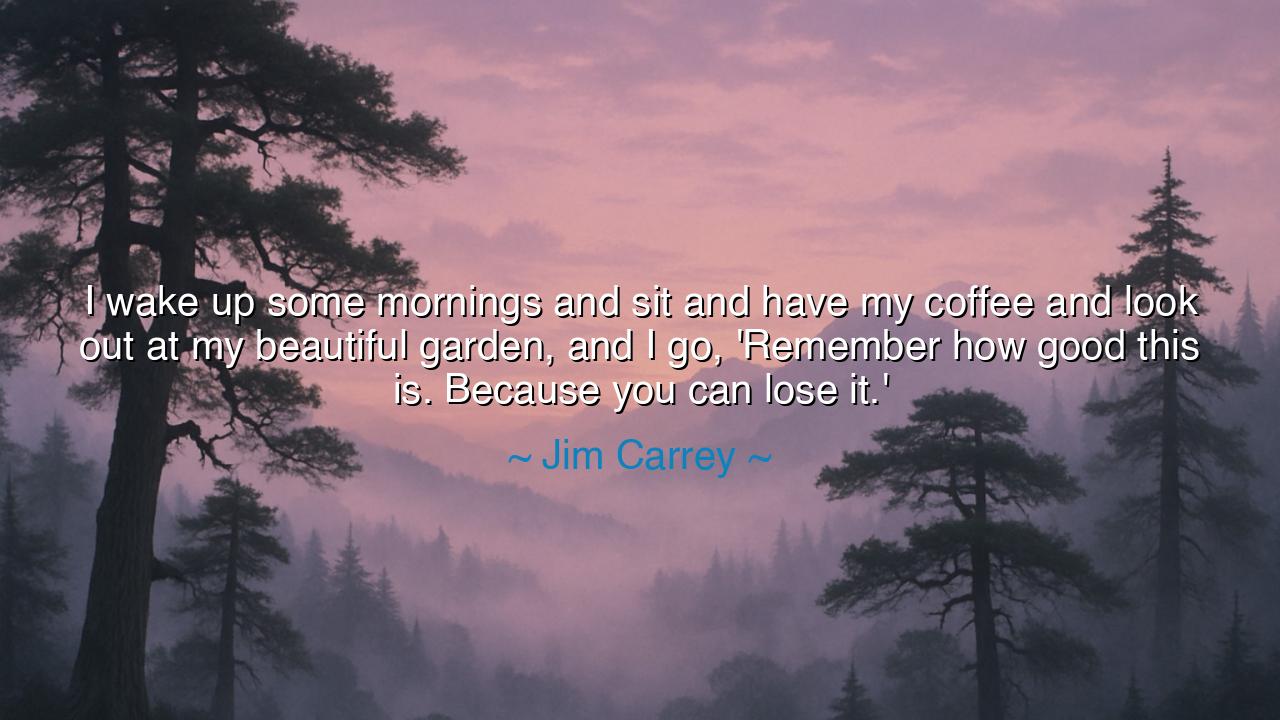
I wake up some mornings and sit and have my coffee and look out
I wake up some mornings and sit and have my coffee and look out at my beautiful garden, and I go, 'Remember how good this is. Because you can lose it.'






The words of Jim Carrey—“I wake up some mornings and sit and have my coffee and look out at my beautiful garden, and I go, ‘Remember how good this is. Because you can lose it.’”—are not merely the musings of an artist. They are a timeless reminder, echoing the wisdom of the ancients, that all things of beauty, all comforts of life, and even the simplest joys are but fleeting gifts. To awaken, to breathe, to behold a garden in its quiet glory—these are treasures more precious than gold. Yet they are fragile, like dew upon the morning grass, vanishing as the sun climbs high.
In this saying, Carrey speaks not of wealth, fame, or power—things with which he is well acquainted—but of presence and gratitude. His garden stands as a symbol of life’s ordinary miracles: the stillness of dawn, the fragrance of earth, the warmth of a simple cup of coffee. The ancients, too, warned that to live without recognizing the sacredness of these moments is to walk blind among wonders. For what is gained by ruling empires or amassing riches, if one forgets to marvel at the bird’s song or the laughter of children?
The origin of such wisdom lies deep within the human heart, tested by loss. Every civilization has known the rise of cities and the crumble of their stones. The people of Pompeii, who once feasted and sang, were silenced in an instant by fire from the mountain. Their homes, their gardens, their lives—all vanished in a day. What they held as permanent was revealed to be fragile as glass. Thus, Carrey’s words carry the same weight as the warnings of history: what you cherish today may be gone tomorrow.
Consider the story of Marcus Aurelius, the philosopher-emperor of Rome. Surrounded by power beyond imagining, he reminded himself each morning: “You could leave life right now. Let that determine what you do, say, and think.” He, like Carrey, knew that mortality makes beauty precious. The sweetness of the moment is sharpened by the knowledge that it will not last. Even emperors, with their legions and their wealth, cannot command the future. They can only bow to the fleeting majesty of the present.
The emotional power of this truth is not meant to cast us into despair, but to stir us into gratitude and vigilance. When Carrey gazes upon his garden and whispers remembrance to his soul, he is practicing what the sages called mindfulness. He is guarding against the slumber of habit, that dulling of the spirit which makes wonders seem ordinary. In doing so, he calls us also to awaken, to taste the sweetness of life before it slips away unnoticed.
What then is the lesson for us? It is this: Do not wait for loss to teach you the value of what you have. Do not postpone joy until tomorrow, for tomorrow is not promised. Love while you can. Speak kind words today. Take time to feel the warmth of sun on your skin, the softness of grass beneath your feet. To live in gratitude is to armor the soul against regret, and to transform every morning into a holy gift.
Practical actions follow naturally from this teaching. Begin each day with a pause, however brief, to notice one small thing you might otherwise overlook—the aroma of tea, the smile of a loved one, the song of wind in the trees. Keep a journal, and in it record three blessings each night, to remind yourself of life’s treasures. And when adversity comes, as it surely will, you will be steadied by the memory of how good it once was, and how good it still may be.
Thus, let the words of Jim Carrey be not only his reflection but our commandment: remember how good this is, because you can lose it. For in remembrance lies the root of gratitude, and in gratitude lies the path to peace.






AAdministratorAdministrator
Welcome, honored guests. Please leave a comment, we will respond soon